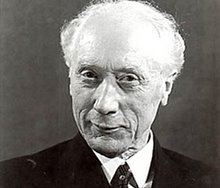"If anything is wrong with a person's use of himself, the first thing is to find out what it is he is doing that is causing the trouble, and to get him to stop doing that. Any other work to help him comes after.
If there is anyone in the audience who does not see this point, to whom it is not quite clear, please ask me now, because we cannot go further if we do not see it. All we are going to do today depends on it. It is a point that is demonstrable. It can be demonstrated any time you like, and if any of you would like me to demonstrate it to you now, I will show you. Perhaps I had better give you an illustration.
Twelve months ago a well-known scientist came to see me, with one of your leading people in education. I realized that he would be accustomed to observe experiments closely, so I said to him, "Let me demonstrate."
"Very well," he replied.
I got a chair and asked him to sit down, and he sat down very much like this [Alexander demonstrates]. That is a complete interference with the primary control that Magnus has worked out. I pointed this out to him, and he knew enough of physiology to know that I was right.
"Look here," I said, "if I tell you I can teach you to stop that at once, will you believe me?"
"No," he said, "I won't. I have been doing it all my life and I am fifty years of age. If you have had a habit for fifty years you can't stop it at once."
"My dear fellow," I said, "if, when I ask you next time to sit down, you give consent and say 'yes,' you will do it exactly as you have always done it, won't you?"
"Certainly," he replied.
"You do not want to go on doing it like that?" I asked.
"No," he replied, and got up from the chair.
"Very well," I said, "next time, when I ask you to sit down, do not give consent to sitting down."
His friend over in the corner here put in, "Oh, but he is not sitting down."
"Please give us a chance," I said, "do not go too quickly," and I continued with my demonstration.
"It is agreed between us," I said, "as two people who are trying to reason something out, that if I ask you to sit down, you simply do not give consent."
Here he stopped me and said, "Stop, please. May I put that in my own language?" and, turning to his friend, he said, "That is a wonderful truth. Is it not? So simple, so effective."
"Very well," I said, "try it. Sit down."
"No," he returned, as we had agreed.
Now we come to the point where I come in.
"Instead of sitting down," I said, "I want you to give certain orders which will affect the primary control, and then let me, with my hands, do the activity side of it. Allow your knees to go forward and you will find you will be sitting down."
[Alexander demonstrates.]
You see it now, all of you, don't you? Perfectly clearly. A perfectly simple principle that you can work out in everything."
(Alexander, F. M.: The Bedford Lecture, in: Articles and Lectures, 1995)
Hör auf, das Falsche zu tun. Alles andere kommt danach.



Keine Kommentare:
Kommentar veröffentlichen